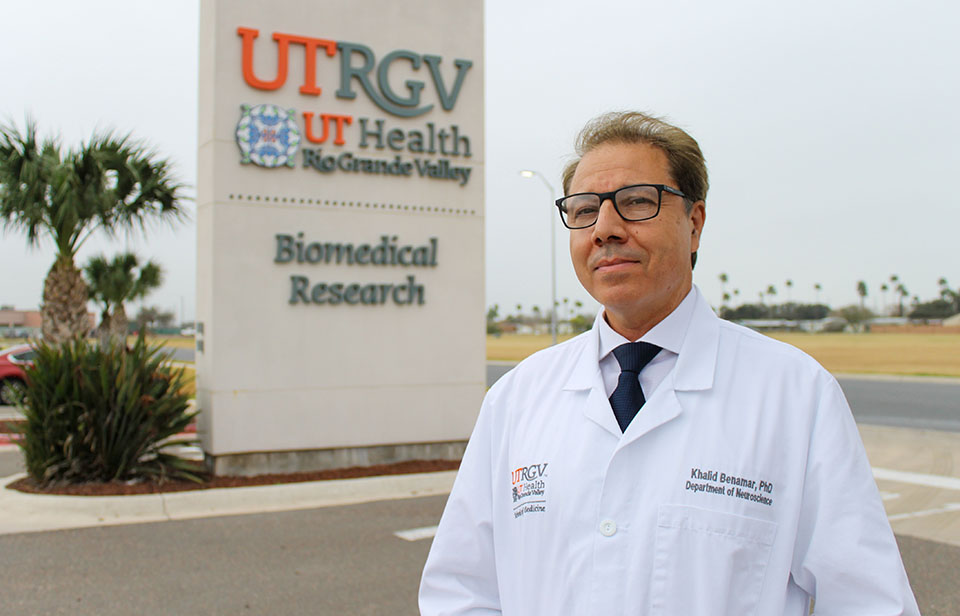By Heriberto Perez–Zuñiga
RIO GRANDE VALLEY, TEXAS – APRIL 23, 2024 – Simple tasks like slipping on your shoes often can feel insurmountable for patients with chronic pain.
Constant pins and needles on the soles of the feet, a burning feeling in the arm, or a sharp pain in the neck are some of the symptoms that can make even the simplest activity seem like a challenge. It’s the sort of condition that highlights the pervasive and debilitating nature of chronic neuropathic pain.
Now, thanks to a $500,000 grant awarded by the Trauma Research and Combat Care Casualty Collective (TRC4), researchers at the UTRGV School of Medicine’s Institute of Neuroscience will examine the effectiveness and safety of novel strategies for dealing with chronic pain and depression.
NEW HOPE
Dr. Khalid Benamar, professor of Neurology and Behavioral Health at the UTRGV School of Medicine and principal investigator on the grant, said reduced quality of life for many patients with chronic pain often can lead to other conditions, such as depression.
“Chronic pain is not merely a physical sensation; it can affect every aspect of a patient's life," Benamar said. "Restrictions in mobility or sleep deprivation caused by chronic pain symptoms can have significant neurological effects on a patient. Our research aims to offer new hope and relief to those who have long endured this complex and burdensome condition."
Benamar said current treatment options for chronic pain often are ineffective and can have associated side effects.
UTRGV School of Medicine researchers will search out new ways of treating symptoms and explore the relationship between chronic pain and depression. The research will prioritize non-opioid therapies, aiming to enhance the efficacy and safety in managing this challenging comorbidity, Benamar said.
COMBATING CHRONIC PAIN
The research will provide insight into new treatment options for patients with chronic pain, including veterans.
“Chronic pain and trauma are significant challenges faced by many veterans, often intertwining to create complex and debilitating experiences," Benamar said. "Veterans frequently encounter chronic pain resulting from injuries sustained during their service, ranging from musculoskeletal issues to neuropathic conditions."
He said he is hoping these research efforts can have a meaningful impact on the more than 32,000 veterans who reside in the Valley.
Dr. Michael Hocker, dean of UTRGV School of Medicine and vice president of UT Health RGV, said the research being done today holds the promise of transforming the region's healthcare and bringing much-needed relief and hope to veterans and the wider South Texas community.
"We are immensely proud to spearhead groundbreaking research into combatting chronic pain, especially considering its potential impact on our local veteran population," he said. "This research not only signifies our commitment to advancing medical knowledge but also underscores our dedication to serving the unique needs of the Valley community."
ABOUT UTRGV
The University of Texas Rio Grande Valley (UTRGV) was created by the Texas Legislature in 2013 as the first major public university of the 21st century in Texas. This transformative initiative provided the opportunity to expand educational opportunities in the Rio Grande Valley, including a new School of Medicine and a School of Podiatry, and made it possible for residents of the region to benefit from the Permanent University Fund – a public endowment contributing support to the University of Texas System and other institutions.
UTRGV has campuses and off-campus research and teaching sites throughout the Rio Grande Valley including Brownsville (formerly The University of Texas at Brownsville campus), Edinburg (formerly The University of Texas-Pan American campus), Harlingen, Weslaco, McAllen, Port Isabel, Rio Grande City and South Padre Island. UTRGV, a comprehensive academic institution, enrolled its first class in the fall of 2015; the School of Medicine welcomed its first class in the summer of 2016, and the School of Podiatric Medicine in the fall of 2022.

